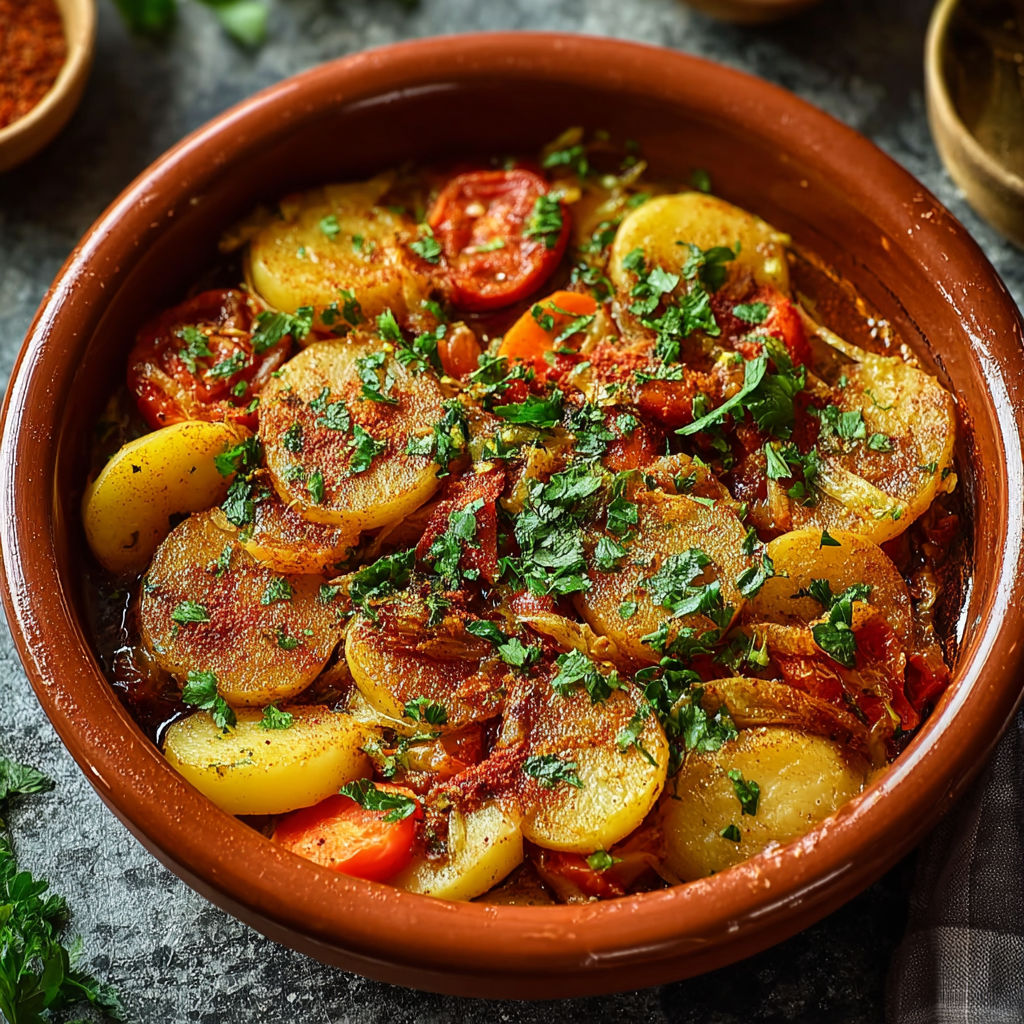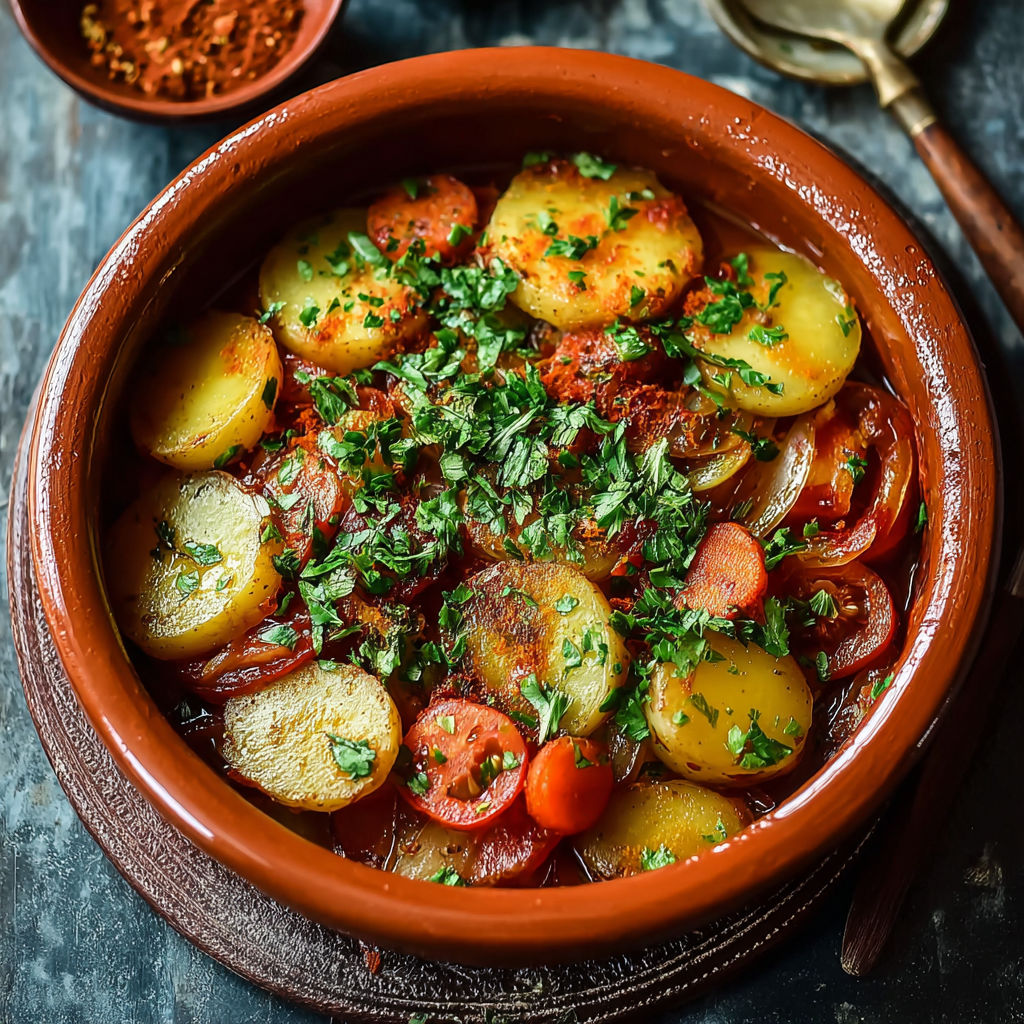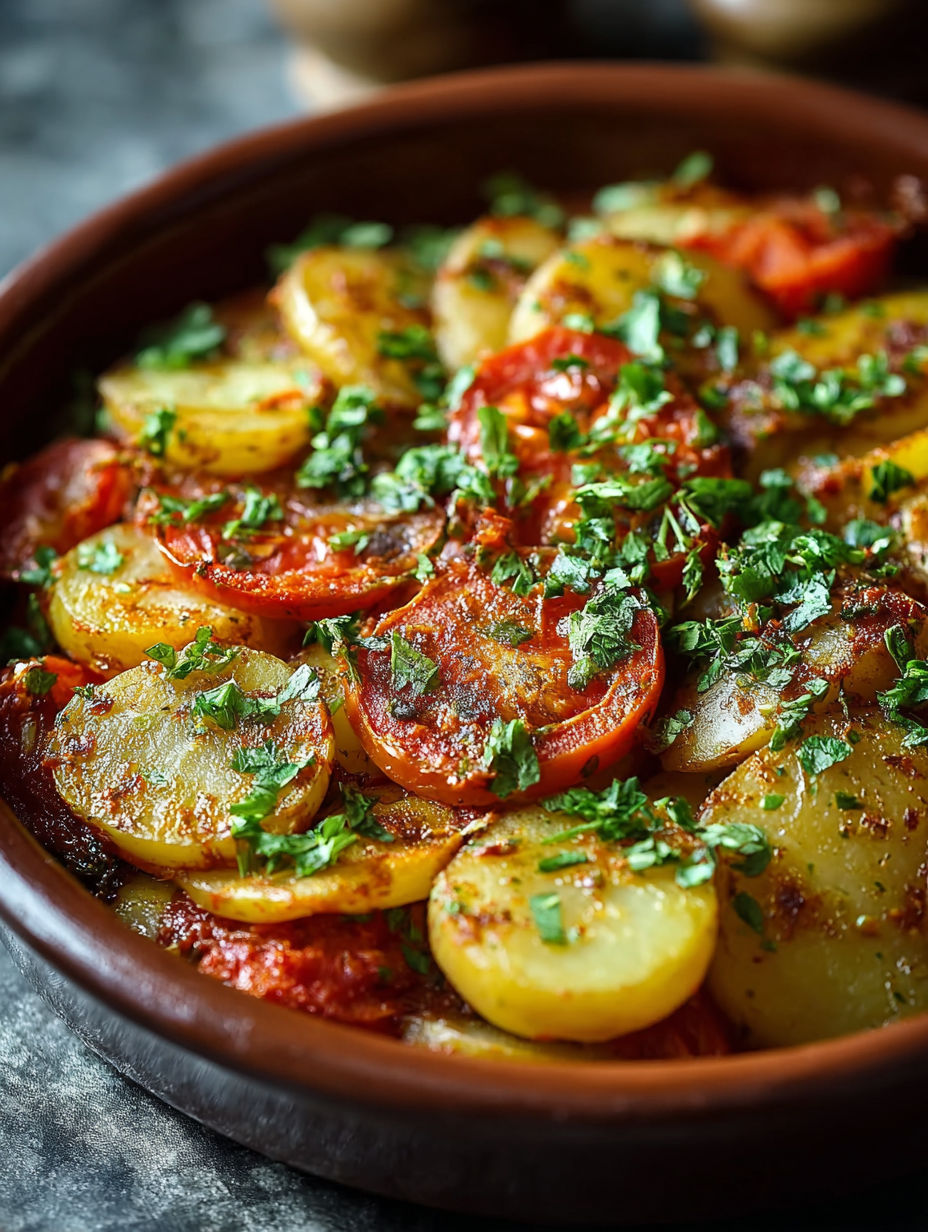 Pin it
Pin it
This fragrant Moroccan Potato Tagine turns basic ingredients into a mouth-watering, tender dish that'll whisk you away to the streets of Marrakech. The stacked veggies cook slowly till soft, soaking up the rich spice mix for an unforgettable plant-based main that needs hardly any hands-on work.
I stumbled on this dish while learning about North African cooking and it soon became my go-to for hosting friends. I love seeing guests' faces light up when they taste such amazing flavors from such ordinary ingredients.
- Olive oil forms the foundation for the spices and helps the veggies brown nicely
- Harissa paste gives real Moroccan taste with a slow-building warmth
- Ground coriander brings lemony hints that lift the whole dish
- Ground cumin adds rich earthiness key to Moroccan food
- Ground ginger gives a light kick without being too much
- Ground turmeric adds that beautiful yellow color and soft flavor
- Yukon Gold potatoes stay intact while getting buttery when cooked
- Onions turn wonderfully sweet as they slowly bake
- Garlic cloves get much milder during cooking adding deep flavor
- Plum tomatoes bring tang and savory notes to balance the dish
- Carrots add natural sweetness and lovely color contrast
- Vegetable broth makes steam for cooking while boosting taste
- Fresh cilantro adds a fresh herbal pop to finish
Crafting Delicious Moroccan Potato Tagine
- Mix the spice blend
- Stir olive oil with harissa paste and all the ground spices in a small bowl until well mixed. This fragrant mix is what makes your tagine special and helps spread flavors throughout. Take a second to enjoy the amazing smells before moving on.
- Season the potatoes
- Mix your cut potatoes in the spice blend making sure each slice gets covered evenly. Your hands work best for this job as you can feel when everything's properly coated. The potatoes really soak up these flavors so don't rush this step.
- Start the bottom layer
- Spread half your onion slices across your baking dish bottom for a tasty base. Add half the spiced potato slices slightly overlapping them then scatter half the garlic throughout. This way of layering makes sure every bite has good flavor.
- Put in first round of veggies
- Place half the tomato slices and half the carrot slices on top and add some salt and pepper. Adding salt now helps flavor the veggies from the inside as they cook.
- Finish the layers
- Do the whole layering thing again with what's left keeping the same order. This creates nice flavor sections that will come together while cooking but still keep different textures.
- Pour in the liquid
- Drizzle any leftover spice mix over everything then carefully pour vegetable broth around the sides without messing up your pretty layers. The broth makes steam that will cook everything just right.
- Bake it slow and low
- Cover tight with foil to trap moisture so veggies can cook in their own juices. Bake at a medium heat taking your time so flavors can really develop and veggies get super tender.
- Let it sit before eating
- Keep the finished tagine covered for ten minutes after taking it out. This rest time lets flavors settle and juices spread throughout. Sprinkle fresh cilantro on just before you serve it.
Harissa paste really is the magic touch in this dish. I first learned to make this tagine from my Moroccan buddy who wouldn't let me swap in regular chili paste. What a difference it made giving a layered heat that builds gently instead of hitting you all at once.
Classic Moroccan Serving
In Morocco folks usually eat tagines straight from the cooking pot using bread instead of forks. For the real deal experience put your tagine out with warm flatbreads like khobz or pita. Everyone uses the bread to grab veggies and soak up all that tasty sauce making dinner more social and fun.
Switch Up Your Veggies
This easy-going dish works with whatever vegetables are in season while staying true to its Moroccan roots. In hot months swap some potatoes for zucchini or eggplant. When it's cold try chunks of butternut squash or sweet potatoes. Want more protein? Toss in some chickpeas for the last 30 minutes of cooking. The spice mix works great with almost any veggie but keep the layering method for best results.
Fresh Side Dishes
The warm spices in this tagine go really well with cool sides. Serve it with a simple cucumber yogurt sauce made from plain yogurt grated cucumber chopped garlic and a bit of mint. Or try a basic salad with orange pieces sliced red onions and black olives dressed with olive oil and lemon juice. These fresh sides balance out the rich tagine perfectly.
 Pin it
Pin it
Create An Amazing Spread
Turn this simple veggie tagine into a full Moroccan meal by adding a few extra dishes. Start with an easy lentil soup flavored with cumin and cinnamon. Serve the tagine as your main dish with fluffy couscous or bulgur wheat to soak up all that sauce. Finish your meal with fresh mint tea and oranges drizzled with honey and sprinkled with cinnamon for dessert.
 Pin it
Pin it
Frequently Asked Questions
- → Can this potato tagine be prepped early?
Sure, you can prep everything up to a day in advance. Finish all the steps except baking, cover, and keep it in the fridge. Before baking, allow an extra 10-15 minutes in the oven if starting cold. Another option: keep potato slices in water and prepare the spice mix ahead of time.
- → Is this dish very spicy?
Not too spicy, as the harissa adds moderate heat. Dial it down by using just 1-2 teaspoons. For more kick, use 1.5-2 tablespoons or toss in some cayenne pepper.
- → What pairs well with this potato tagine?
This dish is great with couscous, flatbread, or quinoa to mop up all those flavors. You can also serve it with a green salad, some preserved lemons, marinated olives, or a dollop of yogurt or labneh for creaminess.
- → Can I cook this in a clay tagine pot?
Yes, a clay or ceramic tagine pot works wonderfully! Make sure it's oven-safe at 350°F (177°C). The shape helps trap steam and keeps the veggies nice and moist, which might shorten cooking time by about 15-20 minutes.
- → How do I know when the tagine is ready?
You'll know it's done when the potatoes are soft enough to poke with a fork but not falling apart. Try sliding a knife into the thickest slice—it should go through with no trouble. The veggies will be tender, and the broth will have turned into a rich sauce at the bottom.
- → Can leftover tagine be frozen?
Yes, but note the potatoes might change texture. Let it cool completely, then store in freezer-safe containers, leaving a little space for expansion. Freeze for up to 2 months. Defrost overnight in the fridge and warm in the oven at 325°F (163°C) until hot.
